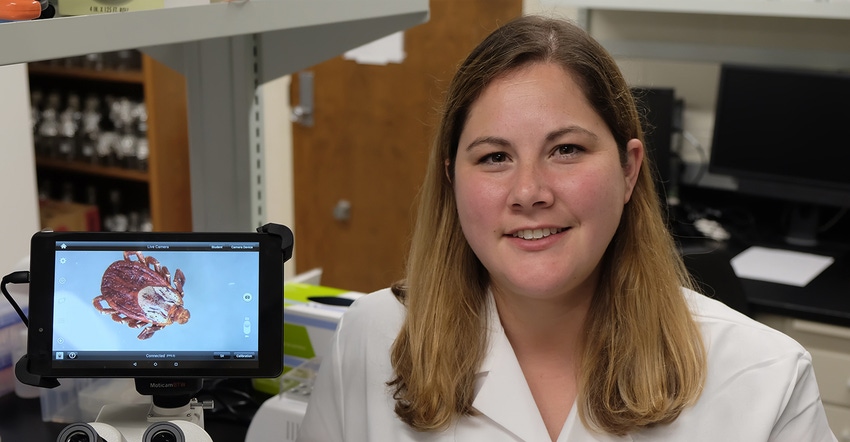April 16, 2019

A research grant from USDA for nearly $1.2 million is supporting work at Kansas State University toward combating a disease that affects cattle in the U.S. and globally.
Kathryn Reif, assistant professor in the diagnostic medicine and pathobiology department in the Kansas State University College of Veterinary Medicine, says the project focuses on optimizing antimicrobial use to control active infection of the hemoparasitic pathogen, Anaplasma marginale, the causative agent of bovine anaplasmosis.
"Different strains of the pathogen are actively circulating in the U.S.," Reif says. "We are using a combination of A. marginale strains, some of which we recently isolated from Kansas cattle herds, to help determine how strains differ in their susceptibility to tetracycline antimicrobials, specifically chlortetracycline, the most common antimicrobial used to control anaplasmosis. We hope that by looking at three different chlortetracycline treatment protocols for cattle, we can provide practical recommendations for the Food and Drug Administration and ultimately for cattle producers toward controlling this disease."
Reif says that treatment policies should be based on a firm understanding of how antimicrobial therapeutic effect can be maximized while minimizing risk of resistance development.
"Cattle producers in Kansas and beyond are concerned that the current FDA-approved anaplasmosis treatment regimens are not sufficiently controlling diseases," Reif says. "Also, there is no fully USDA-approved vaccine for anaplasmosis, and the experimental vaccine, available in some states, does not prevent infection. Efficacy concerns over the current anaplasmosis control measures underscore the need for updated science-based recommendations to help cattle producers manage this disease."
While Reif specializes in vector-borne disease research, her research team at Kansas State University consists of experts in many other disciplines, including molecular biologists, clinical pharmacologists, an antimicrobial resistance specialist, extension agents, livestock veterinarians and experts in the development and delivery of innovative decision support tools.
"With these combined skill sets, our team is uniquely qualified to conduct the proposed program of research," Reif says. "Together, we have the capability to answer these innovative research questions and communicate the outcomes effectively to the scientific community and stakeholders in the livestock industry."
Toward the latter effort, Reif says her group will host an anaplasmosis outreach event May 20 at the Hilton Garden Inn in Manhattan, which will include a number of invited speakers and a producer-panel to discuss strategies and best practices for managing anaplasmosis. Producers and other individuals interested in learning more about anaplasmosis can register online.
Source: Kansas State University News Service, which is solely responsible for the information provided and is wholly owned by the source. Informa Business Media and all its subsidiaries are not responsible for any of the content contained in this information asset.
You May Also Like




